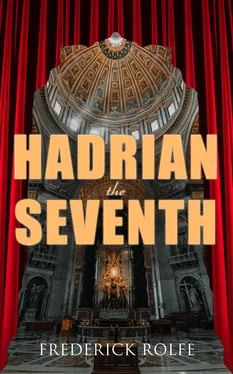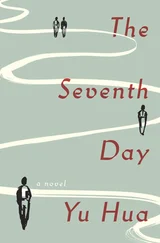His eyes, as they wandered round the room, met these things. He took a towel, and went downstairs to the bath-room to wash his hands. On returning he enticed Flavio with a bit of string. The cat was unwilling to play: gazed at him with innocent imperscrutable round eyes: elaborately yawned and requested permission to retire. The odour of the kitchen-dinner was perceptible. The door was opened; and shut.
He put the butt of his cigarette in an earthenware jar on his left for future use. The maid appeared with his lunch, a basinful of bread and milk. Following some subconscious train of thought, he stretched himself, took the little mirror from the wall and went to the window.
"It's one of your bad days, my friend," he commented, regarding his own image. "You look all your age, and twelve years more. Draw down those feathered brows, man. Never mind the upright furrow which makes you look stern. Draw them down; and open your eyes; and look alert. Do something to counteract the tender thin line of that mouth. You mustn't let yourself relax like this. It brings out your wrinkles, and shews the sparseness of your hair. If you had an inch more thigh, and say a couple of inches more shin, you might look people down a little more: but with that meek subservient aspect— how Luckock used to chaff about it!— no wonder everyone takes advantage of you. What's the good of having your fastidious mind clearly written on that fastidious mouth if you don't insist on behaving fastidiously. Cultivate the art of looking as though you were about to say No. You always can say Yes after No. But, if you begin with Yes, as you always do, you prevent yourself from ever saying No. That's why everyone can swindle you. You're far too anxious to give way. Buck up a bit, you ugly little thing! Ugly as you are, you're neither vulgar nor common-place. Straighten your back, and open your eyes wide, and pull yourself together."
He put the mirror in its place; and again cast a glance round the room, seeking something to read, something, anything, that was not too recent in his mind. He picked up at random one of the rejected novels. It was called Donovan. He remembered having seen (in an ex-tea-pedlar's magazine) a print of the writer thereof. He also remembered that he had found her self-conscious pose and labial conformation intensely antipathetic. His sense of beauty was a great deal more than acute. Let his predilection (which was for reticent expert virtue in the male and for innate delicate modesty in the female) once be satisfied, and the door to his favour lay open.
"However," he argued with himself, "she sells her books by tens of thousands while we don't sell ours by tens of hundreds. We'll have a look at her work, and see how she does it."
He ate his bread and milk; and seriously and deliberately set himself to dissect and analyse the book.
The manner of the portrayal of a youth, of an abnormal type of youth, the Sentient-Modest type, at once disgusted him by its inadequacy and superficiality. The male human animal is omnipresent: it is not difficult for an observant and careful writer to describe the γνωριμωτερον ϕνσει, things as they appear. But the author's sex had prevented her from knowing, and therefore, from describing the γνωριμωτερον ἠμιν , things as they are. It is doubtful whether Man ever mentally knew Woman. It is certain that Woman never knew Man; except in cases of occession— the author of The Gadfly for example. He found the image of Donovan fairly convincing: not so the real. Donovan, in his eponymous history, obviously was the creation of a good sweet-minded woman, who created him in her own image.
The student several times was at the point of closing the book from sheer annoyance. Only the knowledge that he had nothing else to do, and the desire to gain instruction, caused him to persevere. His temper only was logical in so far as it endowed him with the faculty of pursuance. He began many things: he followed them: oftentimes the influence of Luna on his environment obliged him to pause: but invariably he returned to them— even after long years he returned to them—; and then, slowly, surely, he concluded what he had begun. He had tenacity— the feline pertinacity of vigorous untainted English blood. Cigarette after cigarette he rolled, and smoked. He frequently turned back and read a chapter over again. Flavio mewed for admittance. He took him on his knee: and continued reading, stroking the little cat meanwhile, tickling his larynx till he purred content. So the dull March afternoon passed. At five, the maid brought a tray containing black coffee and dripping toast. At half-past six, he took a bath and attended to his appearance, execrating the pain of his swollen arm and the difficulty of keeping it out of the water. He dined at half-past seven on some soup, and haricot-beans with butter, and a baked apple. Meanwhile he counted the split infinitives in the day's Pall Mall Gazette. When he was adolescent, an Oxford tutor had said of him that he possessed a critical faculty of no mean order. At the time, he had not understood the saying perfectly: but he cultivated the faculty. He taught himself in a very bitter school, the arts of selection and discrimination, and the art of annihilating rubbish. To this perhaps was due his complete psychical detachment from other men. He trod upon so many worms. And few things are more exasperating than a man of whom it truly may be said "A chiel's amang ye takin' notes." After dinner, he returned to his attic with his cup and the coffee-pot: and resumed his task. In time, he forgot the pain of his arm: he even forgot the usual terrified anticipation of the late postman's knock, such was his faculty for concentration. He smoked cigarettes and sipped black coffee now and then, oblivious of Flavio who returned from a walk about eleven and promptly went to sleep on the foot of the bed. A little after midnight, he reached the end of the book: turned back and examined the last chapter again; and put it down.
"Yes," he said, "she's a dear good woman. Her book— well— her book is cheap, awkward, vulgar,— but it's good. It's unpalteringly ugly and simple and good. Evidently it's best to be good. It pays.... Anyhow it's bound to pay in the long run."
He pushed Flavio's chair to the wall near the door: by its side he placed the wash-stand from the left of his armchair. He disposed the armchair also against the wall, leaving a cleared space of garret-coloured drugget between the dead fire and the bed. This was his gymnasium.
"If a book like that pays," he reflected, "it must be that there's a lot of people who care for books about the Good. Why not do one of that sort instead of casting folk-lore and history before publishers who turn and rend you? The pity is that the Good should be so dreadfully dowdy. Evidently το καλον and το ἀγαθον are just as distinct as they were in the days of the Broad-browed One. Sophisms again! Why can't you be honest and simple instead of subtile and complex? You're just like your own cat ambuscading a ping-pong ball as strategically and as scrupulously as though it were a mouse. For goodness' sake don't try to deceive yourself. It's all very well to pose before the world: but there's no one here to see you now. Strip, man, strip stark. You perfectly know that the Good always is admirable, whether it be dowdy or chic; and that what you call the Beautiful is no more than a matter of opinion, worth,— well, generally speaking, not worth six and eight-pence."
He threw all his clothes on the armchair: picked his trousers out of the heap and folded them lengthwise over the towel-rail: powdered his arm with borax and bound cotton-wool over it: looked at his dumb-bells while he brushed his hair: sprayed the room with eucalyptus; and got into bed. Extreme fatigue and pain rendered him almost hysterical. His thoughts expressed themselves in ejaculations when he had tied a handkerchief over his eyes, straightened his legs, and laid his right cheek on the pillow.
Читать дальше











